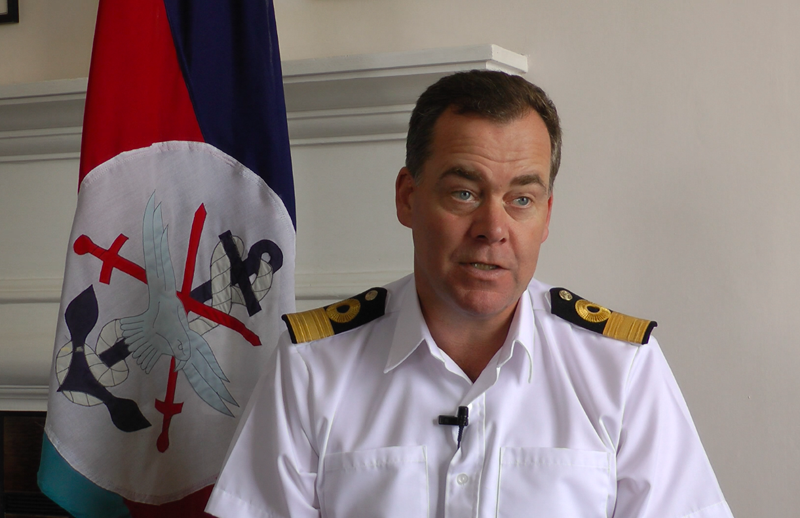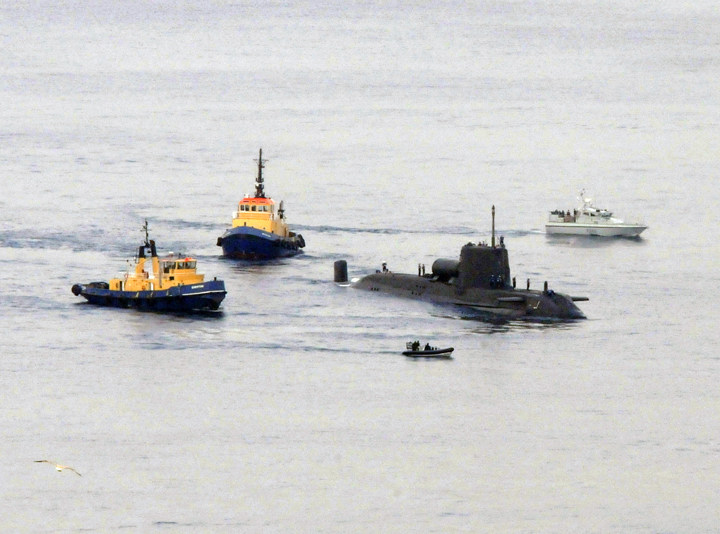Jul 11 - YGTV Interviews Commodore Clink Before He Leaves The Rock For New Post In Scotland
 After 18 months as Commander of British Forces for Gibraltar, we interviewed Commodore Clink before he leaves the Rock to take up the post of Rear Admiral.
After 18 months as Commander of British Forces for Gibraltar, we interviewed Commodore Clink before he leaves the Rock to take up the post of Rear Admiral.
YGTV: What are your reflections on your time as Commander of British Forces in Gibraltar?
Commodore Clink: I’ve had a fantastic time here – it’s been a real privilege to command around 1,000 people from the Army, the Navy and the Air Force. More than half of the people here are locally employed and they are a key component in a really tight team and we use that team every day to support the armed forces as they come through Gibraltar on their way to operations. I am very proud of what we’ve achieved.
YGTV: Your time here has been dominated by Spanish incursions – what challenge has this presented?
Commodore Clink: It’s true that it’s dominated a lot of my time. It presents a challenge in the sense that we have to make sure that what we do on the water does not escalate a situation that is completely inappropriate. We have to strike a balance between making sure that we are demonstrating that British Gibraltar Territorial Waters are just that - they’re British. We do this with the Royal Navy Gibraltar Squadron and Windmill Hill signal station who do a terrific job of keeping a good lookout over what’s going on. We don’t want this situation to get out of hand – Spain is an EU partner and, more importantly for me as a naval officer, they’re a key NATO ally. What I’m concerned about, more than anything else, is that there’s going to be a stupid accident out on the water caused by boats travelling at high speed in what is globally recognised as a congested stretch of water. We just have to make sure that we keep cool heads and I often say to my guys: “You might have a bit of fire in your belly but you’d better have ice in your mind.”
YGTV: So how do you strike that balance between not escalating the situation but also remaining firm? There have been calls for tougher action – have you responded?
Commodore Clink: Tougher action is something that we keep constantly under review and I think that in the past 18 months that I’ve been here we have been more robust on the waters. We certainly manage to get in between the survey vessels and the Guardia Civil with the RHIBs and have prevented the deployment of surveying probes. But Spain’s an ally; we’re not at war with Spain and we have to strike a balance. I know the Foreign Office have engaged in a good deal of diplomatic activity which is often behind the scenes. We need to keep things proportional…I’ve got a very good team at the Squadron where we place an enormous amount of responsibility on very young shoulders. This team has excellent training and we conduct drills and exercises, all of which helps us avoid unnecessary incidents.
YGTV: Talk me through the standard response to an incursion – you get the call that a Spanish state vessel is in BGTW, what happens next?
Commodore Clink: Every incursion is different but, generally, they’re detected by Windmill Hill signal station by the sailors working there. This can be done by using binoculars or by picking the vessel up via radar. We have a very good relationship with the Port Authority and use their radars on our screens as well to make sure we get good coverage of the area. That is then reported to the Commanding Officer of one of the Gib Squadron patrol boats on watch 24/7 and he will make an assessment of how to respond. Other than logging what’s going on and reading a warning, we may deploy one of the fast RHIBs which are great because they can be out on the water in five to 10 minutes and can reach speeds of up to 45 or 50 knots so they can get around the Rock pretty quickly to have a presence there and demonstrate that these waters are British.
If it’s a more serious incursion, or it’s taking longer and we want a grey hull out there, then we’ll deploy either HMS Sabre or HMS Scimitar which are slightly bigger patrol boats. It takes them a bit longer to set off so quite often it’s the RHIB first followed by the patrol boat so that we show that Royal Navy presence.
YGTV: Tell me about your new post as Rear Admiral.
Commodore Clink: I am very excited by this and feel very honoured to be going up to Scotland to be the Flag Officer for Scotland, Northern England and Northern Ireland. I’ll also have responsibility for naval reserves. I have already had some experience of that aspect already because we have reservists serving here on a rolling basis so I’ve had a chance to chat with them. It’s going to be a busy time – we’ve got the Scottish referendum coming up although it’s not my place to discuss the final result of that. Of course, in Scotland we have the Clyde naval base where our submarines are based and where some of the mine hunters that you see visiting Gibraltar are also stationed. My role is chiefly as a representative of the Royal Navy in Scotland.

YGTV: What’s your advice to your successor? How will he cope with the unique features that characterise Gibraltar as a military base?
Commodore Clink: There are plenty of unique features here. Gibraltar is the most extraordinary place - it’s a fortress city…there aren’t many places in the world quite like it. I think he’ll enjoy the job very much and working with everybody here be it with those coming from the UK or with the locals. There’s a real commitment here to delivering a very high standard of service to all the units that pass through Gibraltar. There are also challenges like the big refurbishment project which he’s really going to have to push through. He’s also going to have a chance to enjoy some of the pomp and pageantry that we do so well here.






